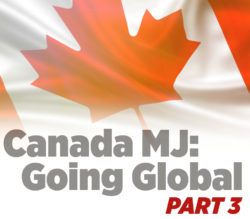(This is the fourth article of a four-part series examining how Canadian cannabis companies are expanding globally. Click to read Part I, Part II and Part III.)
By Matt Lamers
There’s no denying the massive potential of the global medical marijuana market: A recent report pegged it at 180 billion Canadian dollars ($142 billion) over the next 15 years.
But going overseas is fraught with pitfalls, barriers and red tape. Canadian MMJ businesses, however, are export pioneers and can offer valuable guidance.
To capitalize on the global medical cannabis market, about a dozen Canadian MMJ companies are using exports as an avenue to strike local partnerships in foreign markets as well as establish licensing arrangements and distribution deals.
Neil Closner, MedReleaf CEO
Who: You need to find good people. Without that, any company will fail. Specifically in this space, there’s a lot of complexities – dealing with regulators, dealing with growing live plants, dealing with production process issues. You really need to trust and rely on your people. Otherwise you get tripped up. So anyone starting out should make sure they have the right complements of skills and staff.
Where: We look for markets where it’s regulated at a federal level. The fact that most of these markets are going medical only, and it’s even more strictly regulated from a medical standpoint than we are here in Canada, plays to our strength. As the only ISO- and ICH-GMP certified producer in North America, that level of rigour that we bring to the industry plays well for us.
We look at markets based on size, what the distribution’s going to look like, who the buyers are going to be, if there’s insurance coverage.
Aaron Keay, ABcann Global CEO
How: You’ve got to get on the ground over there and spend some time with the agencies and companies that are already there. That way you can build a relationship and start discussing things like collaborations and joint ventures first. We have a presence in (other) countries, but it didn’t happen overnight. We navigated through it with consultants and government officials over time before we got into a position where we now feel comfortable enough to say, “Okay, we can do some business here.”
Marc Lustig, CannaRoyalty CEO
When: Typically the math will end up being an indicator. We’ve seen management teams take on more than what is possible with time, resources and capital. A proper plan that is focused is essential. It’s very easy to build a bridge to the middle of a lake. Before you have grandiose designs on expanding into other markets, you would have to understand the compliance and licensing constraints in that market.
George Scorsis, Liberty Health Sciences CEO
Why: If we’re entering into a system, we need to ensure that we validate the rationale for why we’ve entered into the market, and that it’s to further enhance the medical system. Second, it also insulates us from potential federal interactions.
Strictly look at medical platforms prior to looking at anything recreational or adult use.
Who: Ensure that you partner with people that have great local knowledge.
Cam Battley, executive VP of Aurora Cannabis
Where: It has to be federally legal. We’ve got to make sure that everything we do it kosher with the (Toronto Stock Exchange). I’m very interested in the U.S. market, but I’m not going there until it’s federally legal.
Who: We’re looking for serious people. They have to bring a series of important things to the table. Pedanios (a German distributor) is a good example. They’ve already demonstrated they know what they’re doing through Pedanios’s role as a medical cannabis distributor.
Dooma Wendschuh, Province Brands CEO
Where: One thing we look for when we get to scale is: Let’s find one of the countries in Europe that have legalized medical marijuana and let’s find a suitable partner with whom we can work to build a brewery (the company makes alcohol-free beer using marijuana) in their country so that we don’t have to ship it across the Atlantic. Shipping costs are important to take into account.
The comments have been edited for length and clarity.
Matt Lamers can be reached at mattl@mjbizdaily.com




